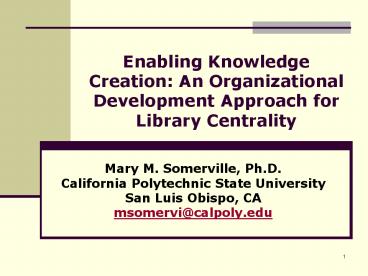Enabling Knowledge Creation: An Organizational Development Approach for Library Centrality - PowerPoint PPT Presentation
1 / 18
Title:
Enabling Knowledge Creation: An Organizational Development Approach for Library Centrality
Description:
The organizational learning environment will ... Continuing evidence-based information practice (Partridge & Hallam) ... Partridge, H., & Hallam, G. (2005) ... – PowerPoint PPT presentation
Number of Views:66
Avg rating:3.0/5.0
Title: Enabling Knowledge Creation: An Organizational Development Approach for Library Centrality
1
Enabling Knowledge Creation An Organizational
Development Approach for Library Centrality
- Mary M. Somerville, Ph.D.
- California Polytechnic State University
- San Luis Obispo, CA
- msomervi_at_calpoly.edu
2
Organizational Development Ideal
- The organizational learning environment will
foster deeper and actionable - understanding
of issues inherent in developing information
literacy within various educational contexts.
3
Organizational Assumptions and Learning Priorities
- Organizational conception of information is real
problem so knowledge enabling experiences aim
to - Surface information conceptions and advance their
complexity e.g., understand sources (textual,
social, physical, and sensory) as more than in
need of metadata description (control) - Stimulate information sharing and reflective
dialogue e.g., activate learning experiences
that produce appreciated benefits from exposure
to diverse perspectives
4
Organizational Knowledge Creation Theories
- Systemic big picture thinking (Checkland/UK)
- Social information to knowledge exchange and
creation processes (Nonaka/Japan) - Differentiated information encounter (and usage
outcomes) experiences (Bruce/Australia)
5
Early Information Literacy Conception
6
Shared Workplace and Classroom Learning Results
- Intellectualquestion assumptions, improve
thinking, and deepen understanding. - Socialencourage cooperation and awareness,
develop social identity, and foster belonging and
community. - Personaldevelop self-awareness and
self-efficacy, encourage commitment, and enable
self-expression. - Practicaldevelop teamwork skills, expand written
and oral communication, and advance group
proficiencies.
7
Emergent Workplace Information Conceptions
- Information control paired with information usage
- Information literacy aligned with disciplinary
mastery - Meaning making occurs through social
negotiation
8
Formative and Summative Learning Assessment
- Continuous KWL reflection
- What do you know?
- What do you need to know?
- How do you want to learn it?
- informs Research Information Services
Education (RISE) forum, database, and education
system design and content.
9
Initial Interactive Processes Assessment
10
Soft System Methodology Processes for
Organizational Meaning (POM)
11
Participatory Design Organizational Evaluation
- User generated, user implemented, user
interpreted research on library systems and
services, including focus groups, usability
studies, campus surveys, and stakeholder
interviews - Qualitative, evidence-based, interactive sense
making dialogue that promotes learning through
iterative problem identification and exploration
12
Master Teacher Leadership Principles
- Leaders foster a learning environment conducive
to enabling knowledge creation through reflective
inquiry and information exchange. - They consistently demonstrate and encourage
contextualizing systems thinking. - They encourage and acknowledge boundary
crossing relationship building. - They practice explicit relational information
literacy in the workplace.
13
Sustaining Organizational Synergies
- Illuminating intersubjective dialogue and
reflection (Lloyd) - Expanding boundaries of concern and influence
- Continuing evidence-based information practice
(Partridge Hallam) - Evolving purposes, processes, and relationships
14
New Campus Learning and Teaching Roles
- Creators of applied educational theory and
producers of active learning experiences, which
are information-resource based and information
literacy-enabling ... that build upon (and
extend) workplace learning experience outcomes.
15
Knowledge-able University Outcomes
- Knowledge Management
- Learning collections development faculty
curricular collaborations - Digital research portals student research
partnerships (Rogers) - Knowledge Integration
- Knowledge Making New Media course (Gillette)
- Literature-Based Scientific Learning (LBSL) case
studies (Elrod)
16
Information Literacy Education Conceptions
- Content Frame disciplinary viewpoint
- Competency Frame performance orientation
- Learning-to-Learn Frame constructivist process
- Personal Relevance Frame experiential
engagement - Social Impact Frame societal implications
- Relational Frame experiential discernment
(Bruce, Edwards, Lupton)
17
Theoretical Foundation for Advancing Library
Centrality
- Originating, exchanging, and exercising
individually held information to enable
collective knowledge sharing and creation
(Nonaka) - Valuing campus constituencies situated
perspectives and establishing exchange
relationships that support inquiry and build
community (Checkland) - Applying expanded information finding,
interpreting, and using conceptions for social
learning through meta-level reflection and
dialogue (Bruce)
18
Selected Core References
- Bruce, C. (1997). The Relational Approach A New
Model for Information Literacy. The New Review of
Information and Library Research 3 1-22. - Bruce, C., Edwards, S., Lupton, M. (2006). Six
Frames for Information Literacy Education A
Conceptual Framework for Interpreting the
Relationship between Theory and Practice. Italics
5(1) 1-18.http//www.ics.heacademy.ac.uk/italics
/vol5-1/pdf/sixframes_final20_1_.pdf - Checkland, P. B. (1999). Systems Thinking,
Systems Practice Includes a 30-year
Retrospective, John Wiley Sons, Chichester,
England - Lloyd, A. (2005). Information Literacy Different
Contexts, Different Concepts, Different Truths?
Journal of Librarianship and Information Science
37 (2) 82-88. - Nonaka, I, Konno, N., Toyama, R. (2000). SECI,
Ba and Leadership A Unified Model of Dynamic
Knowledge Creation. Long Range Planning 335-34. - Partridge, H., Hallam, G. (2005). Developing a
Culture of Evidence Based Practice Within the
Library and Information Profession. Paper
presented at IFLA World Library and Information
Congress, Oslo, Norway.































